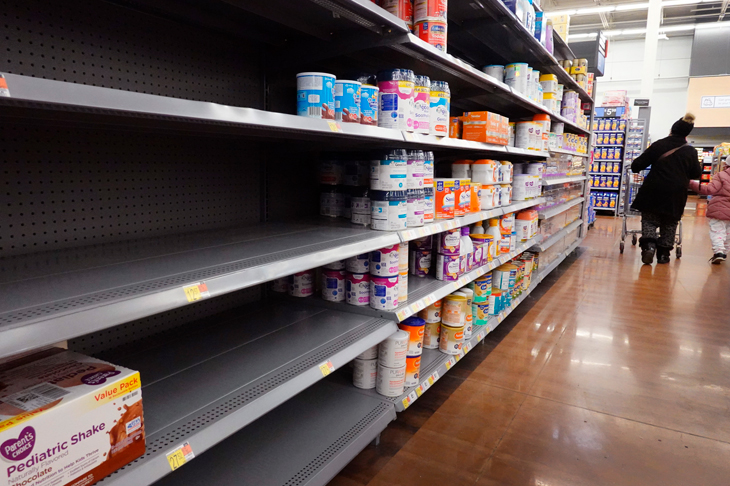You may not have been following the baby formula story in the US. But bear with me – it’s a classic case-study in the failure of government meddling, even if the intentions are worthy.
Concerned that some mothers might be unable to breastfeed (am I allowed to say that?) their children but also unable to afford to buy baby formula, the Women, Infants and Children program came into effect in 1975, the result of a federal government initiative.
For low-income families – the cut-off point is around $50,000 per year – with babies, the program provides formula at no cost. The program is administered through the states and each state negotiates separately with the formula producers to secure sizeable discounts in exchange for exclusivity.
The effect is that, by and large, there is no choice of formula under WIC for families, although there are some exceptions for special requirements – for allergic babies, for example. It is estimated that WIC accounts for half of all baby formula sold in the US.
From the point of view of the producers, this hasn’t been a bad deal because foreign producers were effectively banned from the US market because of the absence of accreditation by the Food and Drug Administration and high tariffs. The effect was to carve up the market – worth around $4 billion per year – between four dominant players accounting for 90 per cent of the market. Abbott is the largest producer, accounting for half of the market.
It should come as no surprise, given this government scheme, that the incidence of breastfeeding in the US is relatively low by international standards. While nearly three-quarters of new mothers in the US start off breastfeeding their babies, only around 43 per cent are breastfeeding at 6 months. But here’s the real rub: among African-American mothers, 58 per cent start out breastfeeding, with less than one-third breastfeeding at six months.
To be sure, there are a number of factors that affect the incidence of breastfeeding, including cultural factors. The absence of mandated parental leave in the US means that many mothers have to return to work relatively soon after the birth of a child. But it is common sense to assume that handing out baby formula free of charge will increase its use. (My guess is that there is also a black market in baby formula just as there is with food stamps.)
The reason why baby formula has been in the news lately is that there has been a shortage of formula right across the US, with parents being limited to a small number of cans to allow the available supplies to be spread as widely as possible. With the large Abbott factory in Michigan closed for some time, the gap between supply and demand narrowed to the point of unmet demand. (This one factory had accounted for around one-fifth of the supply.)
Through hurried processes undertaken by the lumbering FDA, interim certification was given to a number of overseas suppliers, including an Australian one, Bubs Australia. To facilitate this outcome, the lobbying expertise of Joe Hockey, former treasurer and Australian ambassador to the US, was called on. Through his contacts, the company was able to obtain access to the US market which is, needless to say, a boon to that company. A2 Milk, another Australian company, is seeking a similar deal.
The end result has seen crates of baby formula being air-freighted to the US from Australia and Europe. The high tariffs that normally apply to imported formula have been temporarily waived.
It turned out that the FDA was told last year about the problems at the Abbott Michigan plant, which included bacterial contamination of the formula. Evidently, four babies had become very sick and two had died. But the powers that be sat on their hands and no investigations were undertaken until well into 2022. Eventually, the FDA insisted that the entire factory be shut down until remediation work had been undertaken, which took several months. (The general view is that the drug side of the FDA is dominant both in terms of resources and speed of decision-making. One current proposal is that food certification is hived off, with a separate agency created.) The Michigan factory has now come back on line and the shortage of formula that was a concern to many parents, including those not eligible under the WIC program, is beginning to subside.
But there are some broader lessons that should be learnt from these recent events. First, notwithstanding the worthy aim of the WIC program ensuring that infants are well fed, a targeted scheme such as this has downsides – the dreaded unintended consequences.
The alternative is to provide additional income support for new parents with low incomes – we do this through our system of Family Tax Benefits. In this way, parents can choose how best to spend the additional money; it is neutral between breastfeeding and formula-feeding.
The second lesson relates to the mixing up of social policy with industry protection – an undesirable and unnecessary combination. The decision to subsidise baby formula could just as easily have taken place in the context of a free and open market for the product, including imported formula.
But the local producers took the opportunity to make the case for industry protection on the basis that the scheme benefitted from the discounts offered for bulk orders. Sadly, the legislators were too willing to oblige, no doubt patting themselves on the back for killing two birds with the one stone.
Arguably, one longer-term benefit of this fiasco is that overseas producers have now been allowed into the huge US market, which may ultimately drive down the price of formula, including for the half of purchasers who do not quality under the WIC program.
Thirdly, questions need to be answered in relation to the effectiveness of the FDA, both in terms of acting on a potential problem with one of the major accredited producers as well as the thicket of regulatory procedures that has prevented overseas suppliers from breaking into the market. Of course, regulatory incompetence is a perennial issue both in the US and elsewhere.
But without the determination of governments – in this case the US federal government – to ensure that regulations are efficiently and openly administered, many market and social outcomes will continue to be distorted because of regulatory incompetence.
Got something to add? Join the discussion and comment below.
Get 10 issues for just $10
Subscribe to The Spectator Australia today for the next 10 magazine issues, plus full online access, for just $10.
You might disagree with half of it, but you’ll enjoy reading all of it. Try your first month for free, then just $2 a week for the remainder of your first year.














Comments
Don't miss out
Join the conversation with other Spectator Australia readers. Subscribe to leave a comment.
SUBSCRIBEAlready a subscriber? Log in